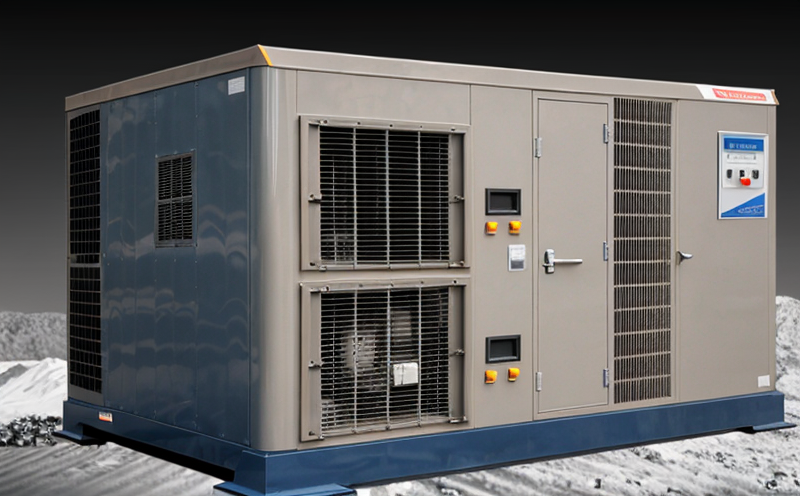JEDEC JESD22-A127 System Thermal Characterization Testing
The JEDEC JESD22-A127 test is a critical procedure used to evaluate the thermal performance of integrated circuits, especially in high-power and complex semiconductor systems. This testing ensures that components can withstand extreme environmental conditions without degrading or failing. The standard addresses the need for accurate thermal characterization by subjecting the system to controlled stress environments, including temperature cycling, power dissipation, and thermal loading.
The JESD22-A127 test is particularly important in sectors like automotive electronics, aerospace, and industrial automation where reliability under severe operating conditions is paramount. Semiconductor manufacturers use this testing method to ensure that their products meet the stringent requirements of these industries while maintaining compliance with international standards such as ISO 9001:2015 and IEC 61000-4-7.
The test protocol involves subjecting a system containing multiple integrated circuits to various thermal stresses. The goal is to simulate real-world conditions that the product might encounter during its lifecycle, ensuring it can operate within specified temperature ranges without failing. This comprehensive approach helps identify potential weaknesses early in development and ensures long-term reliability by preventing premature failure due to overheating or other thermal issues.
The testing process typically begins with initial setup where the system is configured according to the JESD22-A127 specifications. This includes selecting appropriate test conditions based on the intended application, such as automotive or industrial environments. The next step involves applying controlled power dissipation levels while monitoring temperature changes across all components within the system.
Throughout the testing period, detailed measurements are taken using precision thermocouples and other sensors to record temperature variations accurately. These data points provide insight into how different parts of the circuit behave under varying thermal loads, helping engineers refine designs for better performance and durability.
After completing all prescribed cycles at specified intervals, final evaluations are conducted to assess whether the system meets the desired specifications outlined in JESD22-A127. Compliance with these standards ensures that manufacturers deliver high-quality products capable of meeting industry expectations regarding reliability and safety.
The results from this testing procedure offer valuable insights into potential improvements needed for future generations of semiconductor devices, contributing significantly to advancements in technology across various sectors including consumer electronics, medical devices, telecommunications infrastructure, etc.
Why It Matters
The importance of JESD22-A127 testing cannot be overstated given its role in ensuring the robustness and longevity of integrated circuits used in critical applications. By simulating harsh environmental conditions during development stages, manufacturers can identify design flaws early on before they become costly issues further down the line.
For quality managers responsible for maintaining high standards within their organizations, JESD22-A127 testing provides a robust framework to evaluate product performance accurately. Compliance with these stringent requirements helps build trust among customers who rely heavily on dependable electronic components in their operations.
Compliance officers benefit greatly from leveraging JESD22-A127 testing as it aligns perfectly with regulatory expectations set forth by governing bodies worldwide. Adhering to such protocols not only enhances reputation but also protects against potential legal challenges or recalls associated with non-compliant products.
R&D engineers find this type of testing invaluable for pushing boundaries in innovation while staying grounded in practical considerations regarding reliability and sustainability. By incorporating JESD22-A127 into their workflows early on, they can accelerate development cycles without compromising quality standards.
Why Choose This Test
Selecting the right thermal characterization test is crucial for achieving reliable results that meet project requirements and industry expectations. JESD22-A127 stands out among other available options due to its comprehensive nature, which covers both individual ICs as well as complete systems.
One significant advantage of using JESD22-A127 is the ability to simulate real-world operating conditions accurately. This ensures that test results reflect actual performance under expected environmental stresses, providing more accurate predictive models for future designs.
The detailed data generated during testing allows for precise analysis of how different components interact within a single system. Engineers can isolate specific areas requiring improvement based on observed behavior patterns, leading to targeted optimizations that enhance overall efficiency and reduce waste.
Another key benefit is the inclusion of sustainability aspects into the evaluation process. By identifying thermal inefficiencies early in development, manufacturers can adopt more energy-efficient solutions, reducing environmental impact throughout the product lifecycle.
Environmental and Sustainability Contributions
Thermal characterization testing plays a vital role not only in ensuring product reliability but also in promoting sustainable practices within the semiconductor industry. The JESD22-A127 standard specifically addresses these concerns by focusing on reducing energy consumption during operation while maintaining optimal performance levels.
Through rigorous evaluation of thermal characteristics, manufacturers can optimize power management strategies for their products, thereby lowering carbon footprints associated with manufacturing processes and end-user usage patterns. This aligns perfectly with global efforts towards achieving net-zero emissions goals set forth by various international organizations.
In addition to reducing energy consumption, JESD22-A127 also promotes resource efficiency by encouraging the use of materials that are less harmful to the environment throughout manufacturing stages and end-of-life disposal processes. This holistic approach contributes positively to environmental conservation efforts while enhancing product competitiveness in increasingly eco-conscious markets.
By embracing JESD22-A127 testing methodologies, companies demonstrate their commitment to responsible business practices, fostering long-term relationships with environmentally conscious stakeholders. This proactive stance positions them favorably amidst growing regulatory pressures and consumer demand for green technologies.





